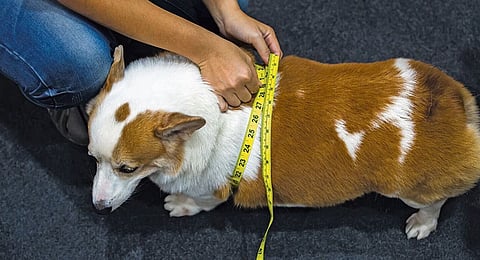
- LIFESTYLE
- FASHION
- FOOD
- ENTERTAINMENT
- EVENTS
- CULTURE
- VIDEOS
- WEB STORIES
- GALLERIES
- GADGETS
- CAR & BIKE
- SOCIETY
- TRAVEL
- NORTH EAST
- INDULGE CONNECT

Preventing pet obesity is not just about diet or nutrition, but it's about consistency, establishing the right routine and sorting a workout pattern that your pets can stick to. Monitoring their weight and educating yourself about the basic nutritional needs of your pet can go a long way.
If you see your pet gaining weight, it's best to consult a veterinarian who can identify underlying health issues that may contribute to weight gain, such as hypothyroidism or hormonal imbalances. Early intervention is crucial in preventing obesity-related complications. Regular health assessments, including blood work and physical exams, help ensure your pet remains healthy and at an ideal weight throughout their life. Here are some basic things that can help you prevent pet obesity
Monitor weight and consult a vet about their nutrition
If you've adopted a new pet, it's essential to start them off with healthy habits since changing their diet can be a hassle. Tracking your pet’s weight and health status is essential in the early detection and prevention of obesity. Regular veterinary check-ups allow professionals to monitor your pet’s weight, body condition, and overall health. Your vet can help establish a target weight and provide guidance on diet and exercise routines.
Weigh-ins should be part of routine visits, and you can also weigh your pet at home using a scale designed for animals. Keep a record of your pet’s weight and note any changes over time. If you notice your pet gaining weight, adjust their diet and activity levels under veterinary supervision.
Be mindful of small, daily decisions
Not all pet foods are created equal, and feeding your pet the right type and amount of food is essential. Take a vet's help to determine the appropriate caloric intake based on your pet’s age, breed, size, activity level, and health status. Commercial pet foods come with feeding guidelines, but these are general recommendations and may need adjustment for your pet’s specific needs.
Overfeeding, high-calorie treats, and feeding table scraps can quickly lead to weight gain. Instead, opt for high-quality, nutrient-dense pet foods that meet your pet’s dietary requirements without excessive calories.
Figure out the kind of activities which work best for them
Physical activity is vital in maintaining a healthy weight for your pet. Regular exercise helps burn off excess calories, build muscle, and boost overall fitness. Dogs, especially, benefit from daily walks, playtime in the yard, and engaging activities such as fetch or agility training. The amount and intensity of exercise should be tailored to your pet’s breed, age, and health. For example, active breeds like Border Collies and Labrador Retrievers require more vigorous exercise, while older or less active breeds may need gentler activities.
Cats also benefit from play sessions using toys, laser pointers, or climbing trees to keep them active. Remember that consistency matters — aim for at least 30 minutes of activity per day for dogs, and multiple short play sessions for cats.
Educate yourself for responsible pet ownership
Being well-informed about your pet’s nutritional needs, activity requirements, and overall health is key to preventing obesity. Educate yourself about the signs of weight gain, such as a lack of waistline definition, difficulty feeling your pet’s ribs, or excessive fat deposits. Responsible pet ownership also involves setting a good example by avoiding overfeeding or giving unhealthy treats.
Establishing a structured routine for feeding, exercise, and vet visits helps create a healthy lifestyle for your pet. Moreover, consider adopting a proactive mindset; if your pet is at risk of gaining weight or is already overweight, seek professional advice early. Engaging with pet nutritionists or trainers can provide additional support and personalised plans tailored to your pet’s needs.